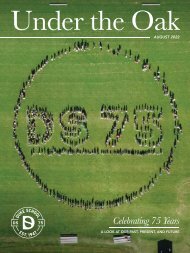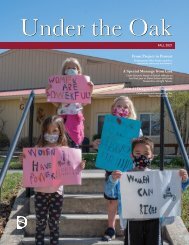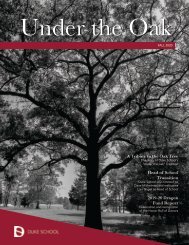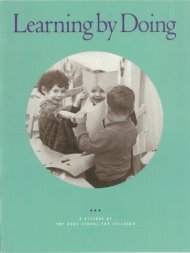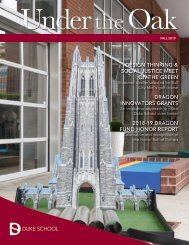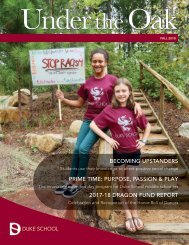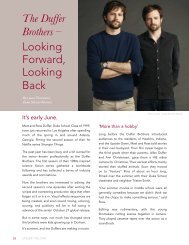You also want an ePaper? Increase the reach of your titles
YUMPU automatically turns print PDFs into web optimized ePapers that Google loves.
PROJECT<br />
WORKSHOP FOR<br />
EDUCATORS<br />
Project-based learning is definitely in <strong>the</strong> limelight<br />
<strong>the</strong>se days. <strong>School</strong>s across <strong>the</strong> country, striving to<br />
prepare students for <strong>the</strong> 21st century, are seeking<br />
ways to engage its students in strategic inquiry<br />
work and problem solving. At <strong>Duke</strong> <strong>School</strong>, on<br />
<strong>the</strong> o<strong>the</strong>r hand, inquiry-based project work has<br />
been fundamental since its inception. As Lower<br />
<strong>School</strong> Director Sandy Gillespie says, “The Project<br />
Approach is designed to get children interested<br />
in learning and to take ownership of <strong>the</strong>ir own<br />
education,” a value now considered as best<br />
practice across <strong>the</strong> country.<br />
When <strong>the</strong> school began getting more requests for<br />
educator tours and project training than it could<br />
handle, Les Webster, <strong>Duke</strong> <strong>School</strong>’s director of<br />
auxiliary and alternative programs, and directors<br />
Kathy Bartelmay, Sandy Gillespie and Jenny<br />
Murray, saw this as an unique opportunity. A<br />
<strong>Summer</strong> Institute for Educators, Project Work:<br />
Preparing Problem Solvers for <strong>the</strong> 21st Century,<br />
was launched in 2013. The workshop quickly filled<br />
with educators from across <strong>the</strong> country, eager to<br />
learn how to implement inquiry-based projects in<br />
<strong>the</strong>ir own schools.<br />
The first seeds for <strong>the</strong> project workshops were<br />
sown in 1996 when Drs. Lilian Katz and Sylvia<br />
Chard, creators of <strong>the</strong> Project Approach, visited<br />
<strong>Duke</strong> <strong>School</strong> and conducted a four-day workshop<br />
for <strong>the</strong> entire faculty. The goal was to deepen every<br />
faculty member’s understanding of project work<br />
and to build a cohesive preschool through eighth<br />
grade program. The school has had an ongoing<br />
relationship with Drs. Katz and Chard ever since,<br />
sending new teachers to <strong>the</strong>ir <strong>Summer</strong> Institute at<br />
<strong>the</strong> University of Illinois and inviting Dr. Chard to<br />
consult on a regular basis.<br />
But most importantly, faculty members continue<br />
<strong>the</strong> work and have conversations day in and day out<br />
about planning projects collaboratively, observing<br />
one ano<strong>the</strong>r’s classroom and sharing samples of<br />
student work.<br />
“The conversations and shared student work has<br />
made a huge difference to student success and my<br />
journey as a learner,” says Julie Marshall, second<br />
grade teacher and project committee member.<br />
As a result of this ongoing work, <strong>Duke</strong> <strong>School</strong><br />
teachers have become leaders in inquiry-based<br />
project work. Their work has been featured in<br />
several publications by Drs. Katz and Chard and on<br />
<strong>the</strong> Project Approach Web site. In addition, Kathy<br />
and Sandy are members of <strong>the</strong> Project Approach<br />
Teacher Education Network (PATEN), a small team<br />
of Project Approach consultants.<br />
Lower <strong>School</strong> art teachers Marki and Jodi with<br />
kindergarten students.<br />
But learning about <strong>the</strong> Project Approach at a<br />
conference is not as powerful as seeing it in action.<br />
When Kathy received a request to train teachers at<br />
<strong>the</strong> Episcopal <strong>School</strong> of Baton Rouge a few years<br />
Sixth grade teacher Michelle Reich with student Lauren Taylor.<br />
ago, she invited <strong>the</strong>m to visit <strong>Duke</strong> <strong>School</strong> instead. Institute for educators each year. The next <strong>Summer</strong><br />
In addition to observing students deeply engaged Institute will be this August.<br />
in <strong>the</strong>ir investigations, educators were able to ask<br />
<strong>Duke</strong> <strong>School</strong> teachers logistical questions that “This has really changed my thinking about project<br />
were essential for successful implementation of work and how to do it. It’s been wonderful to<br />
inquiry-based curriculum.<br />
see kids so engaged and be such great problem<br />
solvers,” one participant wrote in her workshop<br />
“It’s one of my favorite things, to teach teachers,” evaluation.<br />
says Jenny. “We can help more children that way.<br />
It’s exciting to know that what we know about Just as <strong>Duke</strong> <strong>School</strong> teaches its students to be<br />
teaching children best will go to o<strong>the</strong>r schools.” productive members of <strong>the</strong>ir community, <strong>the</strong> school<br />
itself is a great example to o<strong>the</strong>r independent and<br />
<strong>Duke</strong> <strong>School</strong> now hosts a Winter and <strong>Summer</strong> public schools.<br />
12 UNDER THE OAK UNDER THE OAK 13


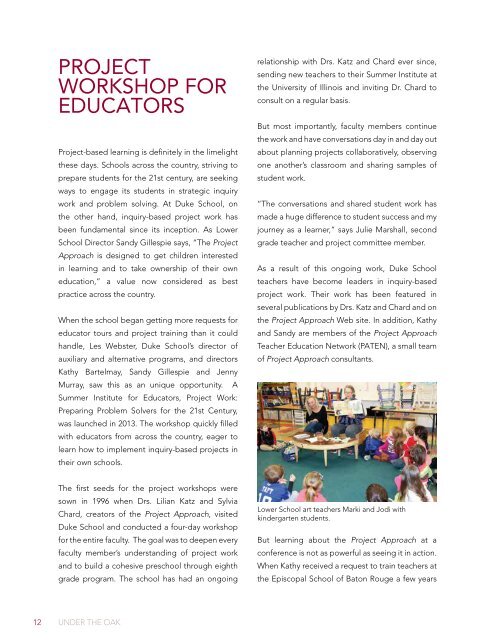

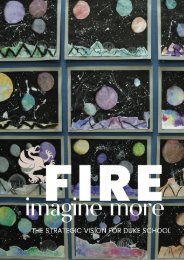
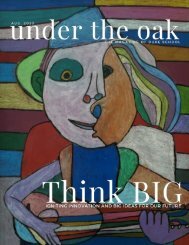
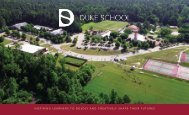

![Under the Oak 2023 [FINAL5] (1)](https://img.yumpu.com/68405392/1/190x245/under-the-oak-2023-final5-1.jpg?quality=85)

